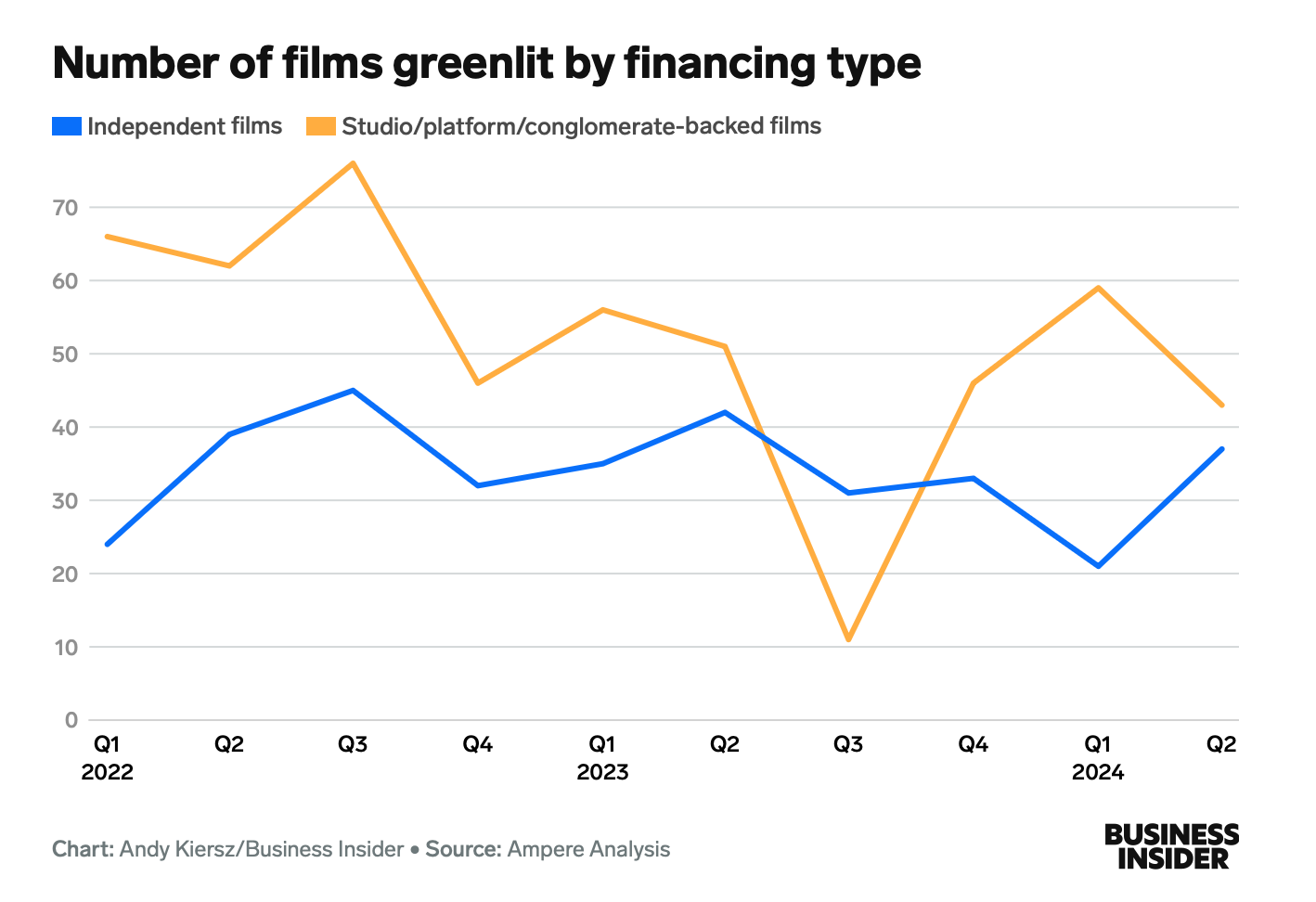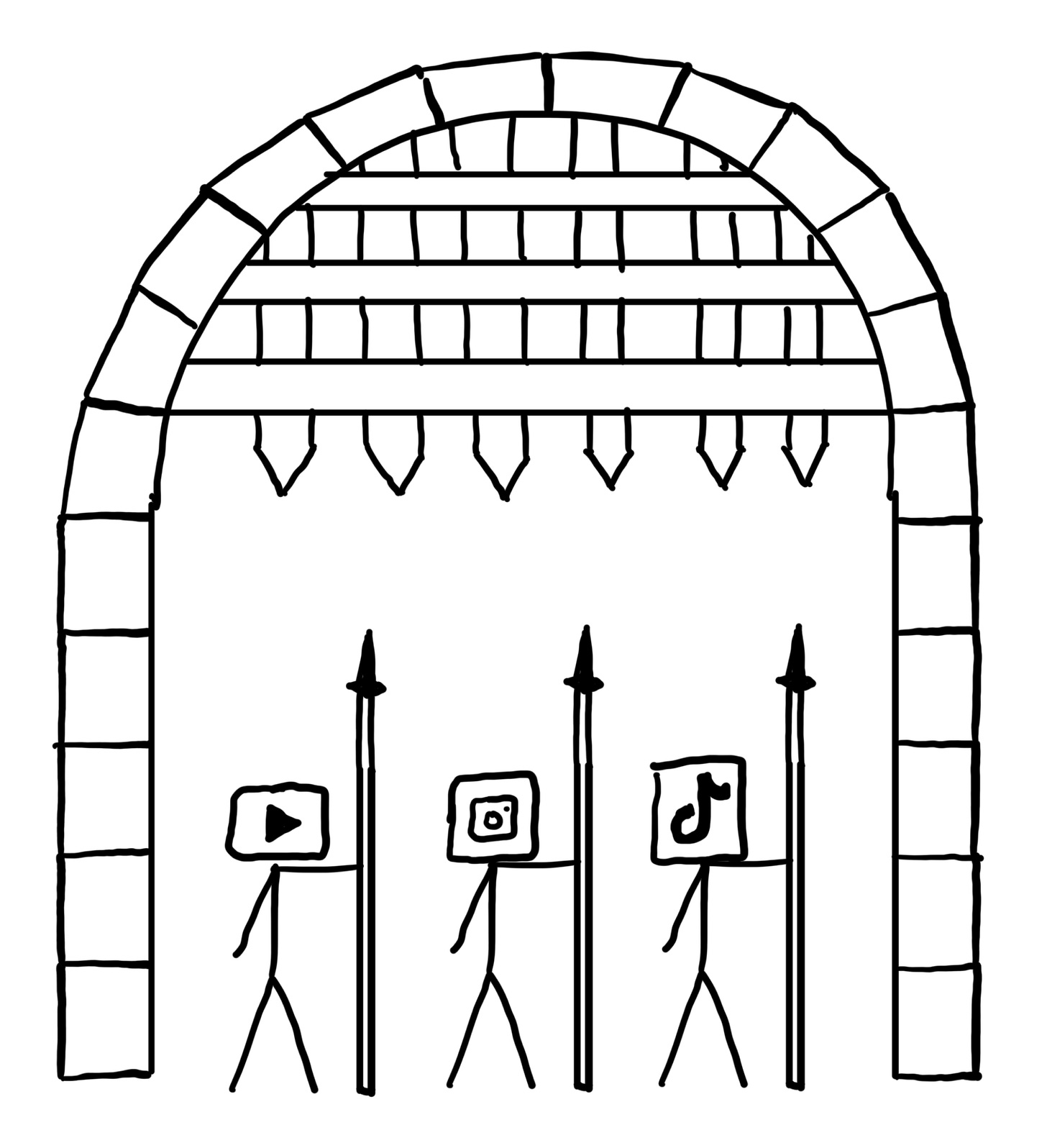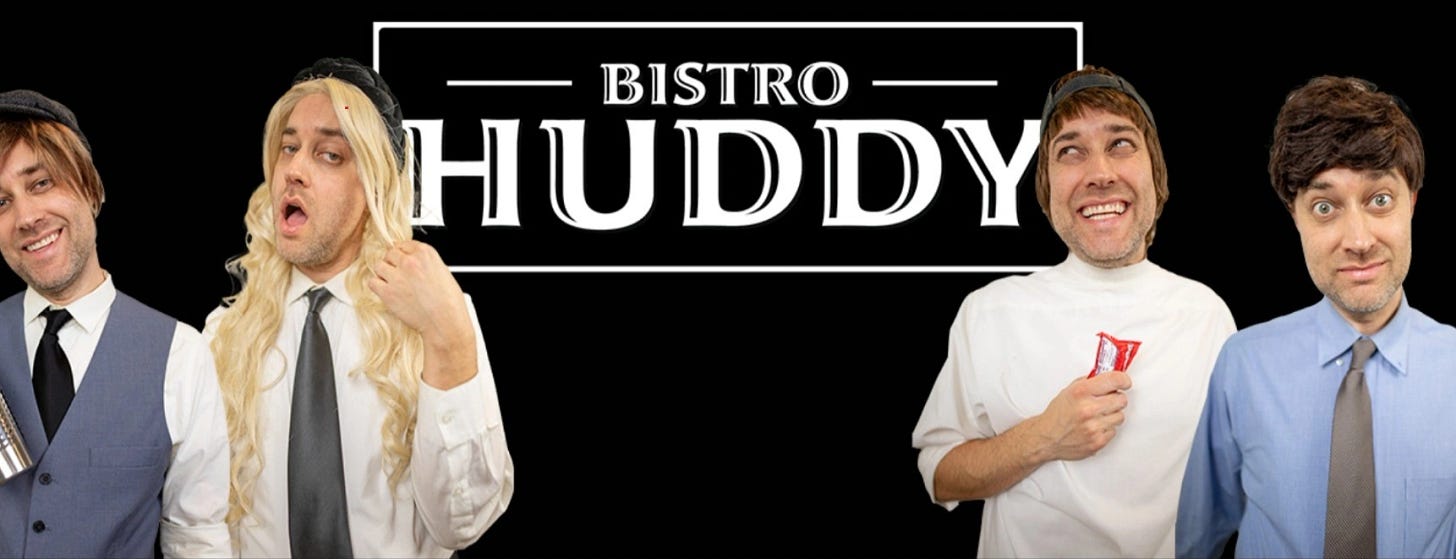In Film & TV, there exist gatekeepers who control the flow of information, talent and money into and out of the legacy media ecosystem. They’re usually busy, powerful and very hard to get a hold of if you’re not plugged in. I’m using this post to illuminate why they exist, how their influence is slowly dying (even if they aren’t), and how you can benefit from the new reality.
What is a Gatekeeper?
Great question. Gatekeepers are people who control access.
Some examples:
Studio & Production Company Execs control access to distribution platforms and budgets… they decide who to crown Showrunners and feature film directors.
Big Name Showrunners control access to writing (and acting) jobs on television… they decide who to crown with coveted writing and acting jobs
Big Name Directors control access to creative roles on feature films
Influential Agents and Managers control access to both sides of the equation - access to creatives and access to the decision-makers who buy shows. The big ones become the focal point between buyers and creatives, which is a very powerful place to be.
Assistants - yes, the people who have no power and low pay - often control access to any of the above. They are crowning “they who shall take a general with my boss.”
That’s right: Even the gatekeepers have their own gatekeepers.
Why do gatekeepers exist?
On any given day, there are 400 billion people trying to break into Hollywood as a writer or director or actor. These people span all walks of life: Every single nurse, insurance claims adjuster, pope and president has - at some point in their life - wanted a job in show business (see fig.1).
If everyone who wanted to be in show business had access to everyone, could you imagine the chaos?
In their defense, Gatekeepers are necessary to keep Hollywood from being inundated by every Minnesota Musicologist and Tennessee Taxidermist that wanted a shot at the bright lights of Tinsel Town.
Apart from these very valid statistics, I’ve spoken with dozens of TV Showrunners over the past 18 months, and every single one described the process of sifting through writer submissions when staffing their show, sometimes as many as 300, and having to read that number of scripts to staff their shows.
That’s roughly 10,000 pages of sample scripts for comedy and 20,000 pages for drama. Spoiler alert: Even the most well-intentioned showrunners do not read past page 7 or 8 by the time they get to the bottom of this stack.
Put simply, if there were no gatekeepers, it would be even worse, and the gears of Film & TV would grind to a halt. Despite the drawbacks of having such centralized control, gatekeepers keep entertainment running.
Or, at least, that used to be true.
As we look around, the Importance of gatekeepers diminishes daily. Their power is falling as creatives leverage their networks (and technology) to tell their stories without the need for a gatekeeper’s approval.
This is evident in the recent rise of indie features (see fig. 3). And now, even TV is following that trend.
This shift is also evident in the market share that social media is stealing from film & TV. Kids no longer want to me movie stars, they want to be social influencers: https://www.cnbc.com/2024/09/14/more-than-half-of-gen-z-want-to-be-influencers-but-its-constant.html
Traditional Gatekeepers are facing multiple headwinds that diminish their control:
There is less budget to make stuff, so their ability to crown winners has shrunk.
They’re getting fired, and losing the access that they gained from being at their organization.
Control of distribution platforms are increasingly unimportant as viewers flock to platforms that are largely creator-controlled (like social platforms).
That last one is why we are here.
The Rise of the New Gatekeepers
Say what you want about subscription-based pay models, the bloat of the streaming wars, lack of quality content… above all, the thing that’s eating away at TV & Film viewership is the proliferation of reasonable quality content on social platforms that meet audiences where they are. For the most part, whoever you are, whatever you’re into, you will find something for you on social platforms.
That’s why viewership is fleeing traditional media - Studio TV and Film projects - and re-parking themselves in front of Instagram, TikTok and YouTube.
These platforms are the new gatekeepers.
But they don’t operate the same way as the old gatekeepers. Anyone with an idea and a camera (read: everyone) can get their stories on one of these platforms - or multiple. They don’t need anyone to greenlight them. They don’t need to endure a gauntlet of generals or pitch meetings. They can simply make the thing in their head, upload it, and start building an audience.
A Social Success Story
A great example of this is Drew Talbert, creator of the hit scripted TikTok series Bistro Huddy. Drew was a frustrated actor and writer from Tennessee living in NoHO who sought success in TV/Film only to find himself serving at a restaurant into his mid-thirties.
He had a pretty classic rock-bottom-struggling-creative-cocaine-addict story, except then, Drew started telling stories on TikTok. He went from not getting any work in Hollywood to crowning himself a Showrunner in a few short years.
So what if he doesn’t have an overall deal with a major studio? And so what if the material is extremely short form and the production value would be considered laughable in some Hollywood circles? Bistro Huddy may not be for you, but it is for the audience of 5+ Million followers that follow Drew.
He found an audience and now earns a Showrunner’s salary doing something he loves: telling a story.
Like all success stories, this is an exception, but it’s one with a repeatable formula: Aim for consistent output, analyze audience preferences, learn and iterate.
I wouldn’t argue this is the only path to find commercial success in storytelling. But - if you’re not already established or well-connected, it’s an easier lift than trying to knock on a shrinking number of gatekeeper doors in legacy media.
What’s more: These social platforms provide the perfect playground for creatives to test real material with real audiences.
And you don’t have to be Mr. Beast, either. You don’t have to appeal to the lowest common denominator with the shortest attention span. There are plenty of creators who have distributed entire feature films on YouTube. Some of them found enormous success this way, and are now fielding calls from Hollywood proper.
And they did it all without asking for permission from a gatekeeper.
The Downsides of the New Gatekeepers
As with any nascent system, there are drawbacks to these new gatekeepers, and it’s up to you to weigh these drawbacks against the possible benefits.
The Pay is Non-Existent (at first)
When a traditional gatekeeper greenlights a project or hires you for a show, there’s usually a pretty sizable paycheck associated with that. By contrast, at least initially, uploading a video to a social platform doesn’t pay squat. This can be a non-starter for working creatives who are used to guild minimums.
Though, if we wanted guaranteed pay, we wouldn’t have chosen the Hollywood dream, right?
You are the Marketing Department
In almost all cases, you can’t just drop your video on a social platform and hope for the best. If you want any shot of success, you have to do your own marketing, which means learning more about your audience. Where do they spend their time? What do they do for fun? What other things interest them? You’re responsible for thinking about all this stuff.
But hey: Maybe it’s not the worst thing in the world to think about your audience every once in a while…
No Guarantee You’ll Find an Audience
Even after doing all the marketing, you may still be left in the unenviable position that there’s just no audience for what you’re making, or audience growth doesn’t justify continuing to make it.
But that’s the case in film & TV, too! The only difference is you are now the person who has to decide to “cancel” the show.
Optimizing for Eyeballs
Optimizing your videos to grab attention can sometimes feel like pandering, and hopefully you’re not thinking more about the video thumbnail and title than you are about your characters / the story.
You are at Their Mercy
In this new reality, you’re trading a development executive for software developers, or - much worse - an AI-powered content moderation algorithm. For my new content creation collective (more on that coming soon), I signed up for a TikTok account using the name of the collective, and after following a couple comedy accounts, I found myself perma-banned, unable to log in.
There was no reason given and it was so abrupt I thought it was a mistake. Still, I lost access to that account based on an arbitrary AI content moderation system. It sucked. But I was able to create a new account just as easily.
Add to that that your platform of choice may end up getting banned, and it can start to feel a bit like the Wild West…
But then again, in Film & TV, all it takes is the opinion of one development executive to knock your project out of the sky.
Production Value has Plummeted
With the proliferation of social content, audiences no longer place such a high value on production value as they did when Hollywood reigned. Thanks to these recalibrated standards, the average YouTube or TikTok show looks much shittier than TV/Film fare.
But good luck convincing a toddler to give up Ms. Rachel because of that.
Don’t Become Your Own Gatekeeper
It’s easy to see external gatekeepers as these mercurial figures who block you from the career success that you’ve earned. What’s trickier is being able to identify when you’ve become your own gatekeeper.
I’ve fallen into this trap before:
When I had a script I was happy with, I would say: “If only I had representation, I would be able to sell my scripts.”
Then, when I had representation: “If only I had a major actor attached to my project, I could sell the packaged project.”
Then, after managing to attach a major actor: “If only I had $100,000, I could film the pilot and then I would be able to sell to a streaming platform.”
Every step of the way, I was waiting for someone to step in and give me the permission I needed to make something. But, in the words of a very successful indie multi-hyphenate Mark Duplass: The Cavalry Isn’t Coming.
I realized after spending my career complaining about gatekeepers, I had become my own gatekeeper. And all I had to do to break the cycle was think differently about my own creative career.
More on that next time. Stay tuned.
Jon










Spot on! Been having this conversation with others for a while now. 😎
I LOVED this article. I've been in my own way and I'm scared to death to step aside... Thank you very much for this.